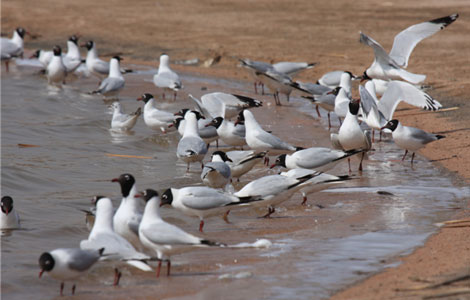Warming to the idea of Arctic exploration
Updated: 2013-05-13 00:26
By ZHOU SIYU in Oslo (China Daily)
|
|||||||||||
But cold comfort for those who expect results in the short term in tough terrain
The Arctic is no virgin. As early as 1920, the first onshore oil wells were dug in Canada's Mackenzie River valley. Since then more than 400 oil and gas fields have been discovered in the Arctic region. However, thanks to the harsh environment and high operational costs, progress for both oil and gas and shipping industries there has been slow.
A warmer Arctic, where melting sea ice clears sea routes, allowing more traffic and construction for better infrastructure, is certainly more inviting. And this is exactly what is happening. Since 1951 the Arctic has warmed twice as fast as the rest of the world. During this period, the temperature in Greenland rose by 1.5 C, compared with a global average of 0.7 C, research data shows. Evidence also demonstrates that the discrepancy is likely to continue.
Glaciers and ice sheets in the region, as a result, have been receding. The minimum ice-covered area in the Arctic occurred in September. It has been shrinking at a pace of 10 percent every 10 years on average in recent decades, according to a report released by the Norwegian risk management and classification society Det Norsk Veritas.
Reminding the world of the serious nature of global warming, the melting Arctic ice has broad implications. Environmentalists regard the region as the last frontier of unmolested natural tranquility and try to protect it from exploration by companies. Meanwhile politicians in the Arctic states are debating the participation of non-Arctic countries in the region's issues, especially China, whose movements now give rise to fears and concerns in the international community, thanks to its rising economic status in recent decades.
To many Arctic observers, this is indeed a worrying scenario. On Sept 17 last year, the ice sheet in the Arctic Ocean diminished to an area of 3.41 million square kilometers, half of the minimum area in 1979, research data shows. Moreover, as the sheet becomes thinner and smaller, the volume of sea ice has melted even faster, shrinking to only a quarter of what it was in 1979. "If this trend continues, the Arctic Ocean might be nearly ice-free in late summer within the next decades," the Det Norsk Veritas report said.
Scientists who have been tracking ice melting in the region for many years were also shocked by the unexpectedly fast pace at which things are developing. They urge that more funding should be raised for Arctic research so scientists could have better knowledge of the region and make more reliable models to predict what is going to happen. "Arctic researchers still face challenges caused by a profound lack of data," Stefan Rahmstorf, professor of Physics of the Oceans from the Germany-based Potsdam University, said at a recent forum.
A diminishing ice sheet would kick off a chain of reactions in the Arctic ecosystem and threaten the unique micro-ecosystem, such as microbial habitats within ice shelves, media and research reports said.
Related Stories
China contributes to development of Arctic 2013-03-25 22:02
Arctic shipping lanes open up 2013-03-14 07:43
China's cold winter linked to Arctic sea ice loss 2012-12-28 20:35
China's arctic pioneers begin work 2012-08-31 11:15
China to open int'l institute for Arctic studies 2012-08-18 20:53
Alien-like marine life in Arctic Ocean 2012-07-18 14:32
Today's Top News
Taiwan dispatches fleet to protect fishing boats
Deputy head of top economic planner probed
China, ASEAN to strengthen mining cooperation
Taiwan demands Filipino response
Moving overseas a remedy for nurses
Death toll rises in Sichuan coal mine explosion
Disclosure delays help fuel online rumors
Warming to Arctic exploration idea
Hot Topics
Lunar probe , China growth forecasts, Emission rules get tougher, China seen through 'colored lens', International board,
Editor's Picks

|

|

|

|

|

|






